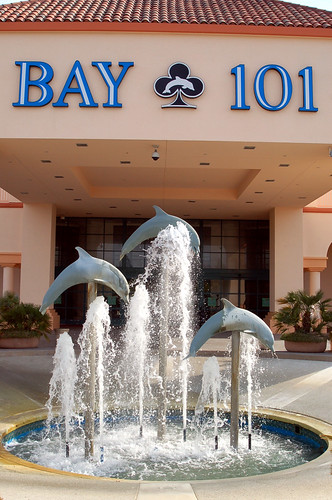 (Flickr photo credit: tobyleah)
(Flickr photo credit: tobyleah)
One of the ways that San Jose is dealing with an upcoming budget deficit is Proposition K. Proposition K proposes to the voters that the two card clubs in San Jose, Bay 101 (pictured) and Garden City, expand the number of card tables from 40 to 49, eliminate a $200 betting limit, and pay 15% tax instead of 13%. The increase in city income is projected to be from $3.6 to $5.3 million.
On the face of it, it seems to be a relatively painless way to increase revenue. Although I drive by Bay 101 all time, I never go in. One research scientist that I worked with told me that lotteries were taxes on people who were bad at math, and this tax seems to be similar. I am good at math and I don’t gamble, so why shouldn”t I vote for this?
But as this article in the San Jose Mercury News points out, Prop K has potentially negative effects on the Asian-American community. We have talked about Asian-Americans and gambling before and how it can be addictive, and so does this article. Filipina Chris Mata says she has lost $50,000 over the years. “It has destroyed a lot of families, especially during the downturn of the economy when people are distressed and want to make quick money,” said H.G. Nguyen, president and founder of the Vietnamese-American Chamber of Commerce. She tells the story of a friend who often called her crying after her husband beat her because she had no more money to give him for gambling at the card clubs.
Other Asian-Americans say the casinos are just a fun diversion. “I come here to chill out. It’s fun; I’m not betting my house or anything,” says 25-year-old San Jose student Raj Patel. “Everybody has to control their gambling. Being in control is the first thing to be.”
The city fire department and the mayor of San Jose, Chuck Reed, are said to be for the measure. The police chief is reported to be neutral, while San Jose Police Officers Association President George Beattie is against the measure, citing a potential increase in crime.








